On 13-14 March 2017, TÜV Rheinland held the 2017 Solar Congress and “All Quality Matters” Award Ceremony in Wuxi, Jiangsu. Junfeng Li, Director of the National Centre for Climate Change Strategy and International Cooperation (NCSC), Dinghuan Shi, Counsellor of the State Council and Sicheng Wang, Research Fellow of Energy Research Institute National Department and Reform Commission, together with 200 senior leaders from renowned businesses in the PV sector, discussed the development trends of the PV industry.
The main guests gave exclusive interviews to SolarBe.com, discussing the prospects of the PV sector and the importance of product quality. They gave the following insightful opinions.
Dinghuan Shi, former President of the China Renewable Energy Society
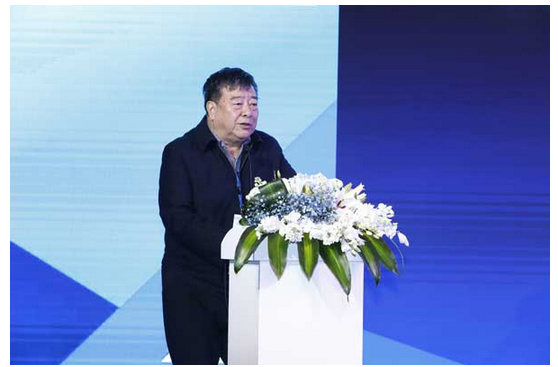
What matters is to strengthen the self-discipline of the PV industry. Businesses must view product quality as the lifeline of the PV sector and of renewable energy development. By building a sound credit system and a sector-specific credit file, we can remove companies who are in breach of contracts and cleanse the market.
We hope that the stable and sustainable development can facilitate an energy revolution and transform the solar PV sector. We must establish stricter, more advanced and world-class national, industrial and association-based standards, together with constant updating and improvement, to distinguish the forerunners from those lagging behind.
China’s PV development cannot be achieved without international cooperation, which is an essential source of Chinese technological talent. Through the growing production capacity of the PV sector we are able to both target the domestic market and expand to sell our products worldwide. Through this process we can contribute in terms of technologies, products and expertise under the guidance of the “Belt and Road Initiative”.
A quality certification system is the key to establishing a green financial platform and co-operation between industry and finance. this can enable insurance agencies and financial institutions to be more aware of the market performance of insurants and of the operation and the generated energy of power plants. The risks of financial institutions can thus be reduced, and investors’ confidence can be strengthened.
A quality certification system is the key to establishing a green financial platform and co-operation between industry and finance. this can enable insurance agencies and financial institutions to be more aware of the market performance of insurants and of the operation and the generated energy of power plants. The risks of financial institutions can thus be reduced, and investors’ confidence can be strengthened.
Third-party inspection and certification, as a sector and as a system, should strive for sound development and contribute to a better industrial environment. By strengthening cooperation and mutual recognition with professional organisations and associations, third-party agencies can enhance self-discipline and benchmark against higher standards, thereby facilitating healthy and sustainable development.
Through the series of events of “All Quality Matters” organised by TÜV Rheinland, enterprises are able to demonstrate products that are more sophisticated and that contribute to the development of the entire industry. The events also help enterprises improve their product quality and competitiveness.
Sicheng Wang, Research Fellow of the Energy Research Institute National Department and Reform Commission
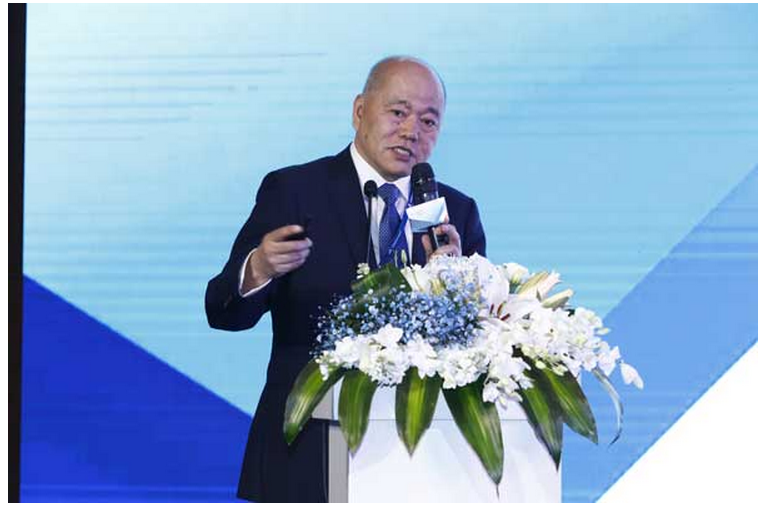
The “Photovoltaic Top Runner Programme” not only reveals the direction of the PV sector but can also solve problems of business models and transactions, while providing specific technologies.
The quality of a PV system can be determined by the performance ratio (PR), which can be easily calculated, but there is still a long way to go before the PR reaches 80%.
Distributed PV is more complex than ground PV power plants in terms of installation. It must be integrated into the building and adapt to all roof types. Distributed PV also has higher safety requirements. Regionally, distributed PV power plants are located in hot and humid areas, and have thus stricter requirement for their modules.
At present, the standards for distributed PV are yet to be unveiled, as are the practical standards of the International Electrotechnical Commission (IEC). It makes sense to readjust existing business models, reduce transaction risks and develop PV modules that are more efficient before implementing distributed PV.
The significance of “All Quality Matters” is that enterprises are encouraged to attach more importance to product quality. Third-party inspection agencies are also expected to release their test data, enabling the entire sector and market to make quality a priority.
Junfeng Li, Director of the National Centre for Climate Change Strategy and International Cooperation (NCSC)
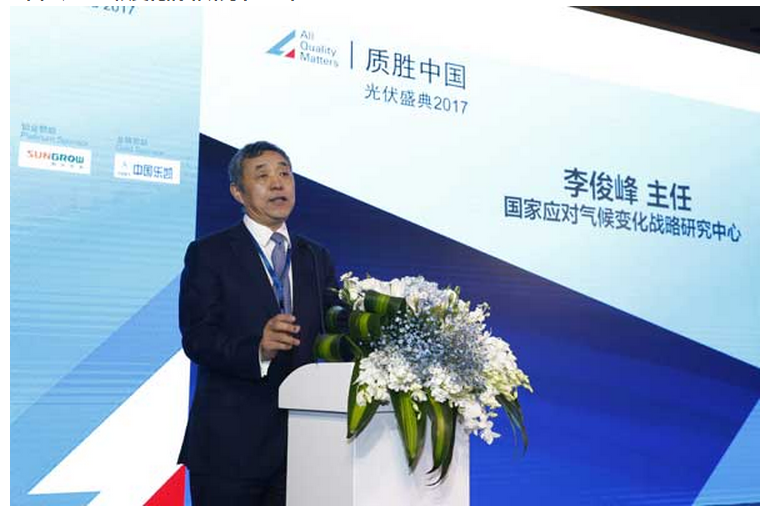
As a small-scale commodity targeting a niche market, distributed PV power plants are crucial to small companies but less important to the domestic market as a whole. Industry development must therefore be balanced, with the emphasis on the overall national energy structure.
The central government is intent on discarding renewable power generation, so PV power companies must be aware of the pace of development. If grid construction is not possible in certain areas, PV power plants should be installed in the load locations. Further power system reforms should also be taken into account, to strive to achieve the green scheduling.
No plants can be established on farmland, and the coastal areas of eastern regions, in particular, consist of 1.8 billion acres of farmland, on which the government cannot therefore allow power plants to be developed.
All power plants, including those that are self-provided, must pay the electric surcharge for renewable energy sources. The annual additional fees will be about RMB 100 billion, according to the calculation of 1.9 cents per kilowatt hour. However, the extra charges at present are below RMB 70 billion, which leads to a delay of subsidies for renewable energy.
The life cycle of a PV power plant is generally 25 years, beginning from the completion of construction. Power plants are thus not simply types of general goods. All the companies involved must value integrity in everything they do, and increase self-discipline to ensure they survive.
Through my speech delivered at the ceremony, I stressed that third-party testing, inspection and certification organisations can regulate the management system of operation and maintenance companies. Credibility has continued to be TÜV Rheinland’s core value for over one hundred years since it was founded.
Hui Shen, Director and Professor of Institute for Solar Energy System of Sun Yat-sen University
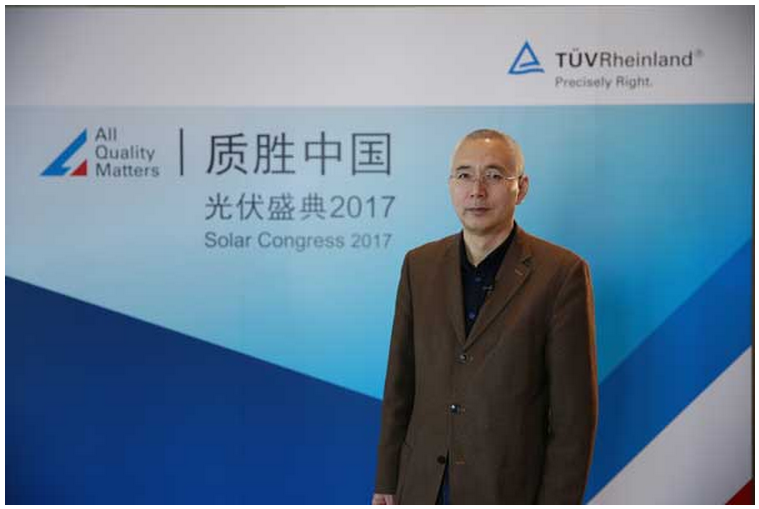
Overall and sustainable development should be taken into account in the PV top runner programme, and we must be results-oriented, but test results must also be released. All power plants, and particularly the best performers, must record and publish their annual power generation results, and any failures of the plant, from completion of construction. This should then be an on-going task.
I wonder whether the data of power generation could be reported as part of the weather broadcast on local TV channels, as advertisements for PV power generation are rare. This would publicise PV power to a much wider audience, and general public could gain a better understanding of the nature of PV.
In addition to examining the overall and continued development of the industry, the main purpose of the programme is to encourage leading businesses to shut down outdated production facilities and thus guarantee the efficiency and reliability of the power supply. We can thus attempt to assess the performance of power plants on demonstration bases.
As a new energy resource, the PV sector needs the government's support, mainly in terms of subsidies. In the long term, however, we cannot rely on subsidies as before. In about five years’ time, PV power plants will be able to be installed by lowering the cost of the PV sector. The application of a scaled development of the industry has been reduced by two or three decades, demonstrating how China can greatly contribute to global wellbeing.
I lived in Germany for five years, and I think the German mind-set is an example for us in terms of excellence and quality. TÜV Rheinland’s support of Chinese PV power plant enterprises will benefit current and next generations. Third-party assessment and authentication organisations are of great importance to the PV sector. The professional testing methods and science-based rules of TÜV Rheinland, in co-operation with Chinese businesses, can achieve a win-win situation. Finally, I also expect that the significant and on-going “All Quality Matters” programme can facilitate overall quality in the Chinese PV sector.
Jing Zhang, Secretary General of the Special Committee of the China Energy Research Society
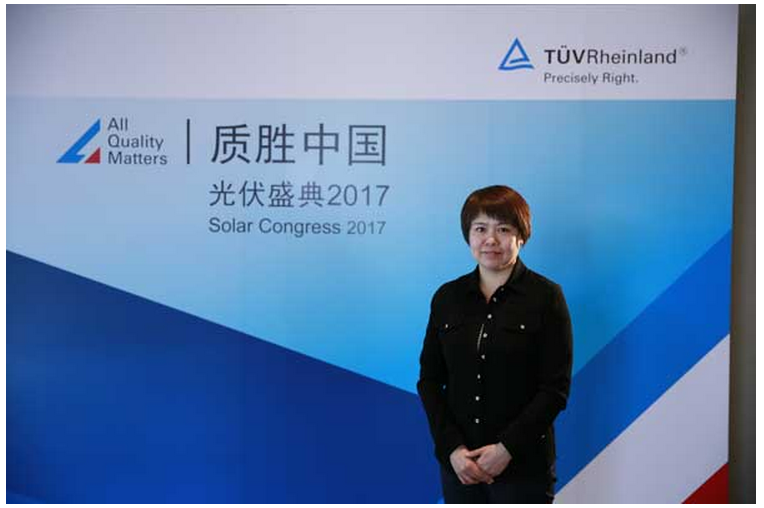
China has world-leading expertise in the development of lithium ion, hydrocarbon and flow batteries. However, we can still make improvements in terms of raw materials and equipment.
Energy storage combined with a PV power supply and electric vehicles is a growing trend. PV can also play an important role in power service. The government will soon unveil preferential policies to encourage the further development of energy storage.
The development of energy storage cannot only rely on subsidies provided by the government. Measures must be taken to focus on the market mechanism from the macro-perspective.
PV energy storage is only economical by taking advantage of the time-of-use pricing mechanism and matching this with the local power load and power supply.
Inspecting is traditionally seen as a very boring business, but in TÜV Rheinland I see a very different aspect: a quality-oriented third-party testing, inspection and certification organisation brimming with internal vitality. We hope that we can work with TÜV Rheinland to encourage the development of the energy storage industry in terms of quality and safety in its initial period.
In the future, under the principle of “Quality Matters”, we must give top priority to quality, safety and standards in both the manufacturing industry and in emerging technology.



